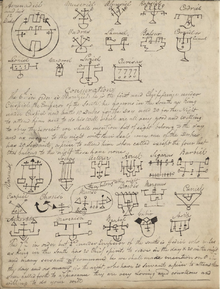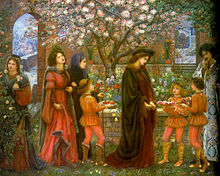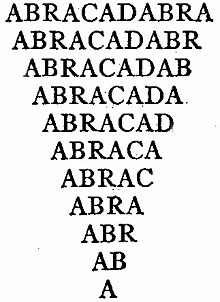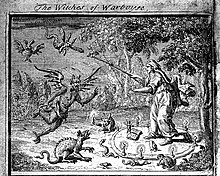Incantation

19th century book of incantations, written by a Welsh physician
An incantation is a magical formula intended to trigger a magical effect on a person or objects. The formula can be spoken, sung or chanted. An incantation can also be performed during ceremonial rituals or prayers. Other words synonymous with incantation is spells, charms or to bewitch. In the world of magic, the incantations are said to be performed by wizards, witches and fairies.[1]
In medieval literature, folklore, fairy tales and modern fantasy fiction, enchantments are charms or spells. This has led to the terms "enchanter" and "enchantress" for those who use enchantments.[2] The term was loaned into English around AD 1300. The corresponding native English term being "galdr" "song, spell". The weakened sense "delight" (compare the same development of "charm") is modern, first attested in 1593 (OED).[3]
Any word can be an incantation as long as the words are spoken with inflection and emphasis on the words being said. The tone and rhyme of how you speak the words matter on the outcome of the magical effect. The tone, rhyme, and placement of words used in the formula matters in influencing the outcome of the magical effect. The person who is speaking magical words usually commands for the magic to be carried out. The incantation performed can bring up powerful emotions and remind one of a sense of awe in childhood.[4]
Surviving written records of historical magic spells were largely obliterated in many cultures by the success of the major monotheistic religions, Hinduism, Islam, Judaism, and Christianity, which label some magical activity as immoral or associated with evil.[5]
Contents
1 Etymology
2 Magic words
3 Uses
3.1 In Jewish religion
3.2 Udug-hul
4 In folklore and fiction
5 Modern uses and interpretations
6 Some collections of charms
7 See also
8 Photos
9 References
10 John Clute and John Grant, The Encyclopedia of Fantasy
Etymology

The Enchanted Garden of Messer Ansaldo by Marie Spartali Stillman
The Latin incantare, which means 'to utter an incantation', or cast a magic spell, forms the basis of the word "enchant", with deep linguistic roots going back to the Proto-Indo-European kan- prefix. So it can be said that an enchanter or enchantress casts magic spells, or utters incantations, similar to what are called Mantra in Sanskrit.[citation needed]
The words that are similar to incantations such as enchantment, charms and spells are the effects of reciting an incantation. To be enchanted is to be under the influence of an enchantment, usually thought to be caused by charms or spells.
Magic words

Classic magic words
Magic words or words of power are words which have a specific, and sometimes unintended, effect. They are often nonsense phrases used in fantasy fiction or by stage prestidigitators. Frequently such words are presented as being part of a divine, adamic, or other secret or empowered language. Certain comic book heroes use magic words to activate their powers.
Examples of traditional magic words include Abracadabra, Hocus pocus, Open sesame and Sim Sala Bim.
Craig Conley, a scholar of magic, writes that the magic words used by conjurers may originate from "pseudo-Latin phrases, nonsense syllables, or esoteric terms from religious antiquity," but that what they have in common is "language as an instrument of creation."
Uses
In Babylonian, incantations can be used in rituals to burn images of one's own enemies. An example would be found in the series of Mesopotamian incantations of Surpu and Maqlu. In the Orient, the charming of snakes have been used in incantations of the past and still used today. A person using an incantation would entice the snake out of its hiding place in order to get rid of them.[1]
In Jewish religion
In Jewish rites reciting a bible verse, a person has to follow strict Jewish rules. The performer of an incantation has to prepare three days ahead of time with fasting, praying and studying. The Jewish law requires that incantations only be recited during the new or full moon, before sunset, and during the Sabbath. The Jewish commentary, the Talmud mentions that incantations are to be in the name of the mother. An incantation of a bible quotation attached to a charm or object is often recited backward and frontwards.[6]
Udug-hul
Incantations are often seen in demonic activity where the devil uses words to bring misfortune or sickness to someone. Some illnesses include mental illness or anxiety. The aspect of the devil in incantations is feared by many. The demon's can create other horrible events of divorce, loss property or other terrible catastrophes in ones life.[7]
In folklore and fiction

The enchantress Alcina makes herself appear beautiful, in Orlando Furioso
In traditional fairy tales sometimes magical formulas are attached to an object and when spoken can help transform the object into the imaginable from the unimaginable. In these stories, often incantations are attached to a magic wand used by wizards, witches and fairy-god mothers. A widely known example is the spell that Cinderella's Fairy Godmother used to turn a pumpkin into a coach. Incantations often nonsense or whimsical rhymes are performed.[8]
Modern uses and interpretations
The performance of magic almost always involves the use of language. Whether spoken out loud or unspoken, words are frequently used to access or guide magical power. In The Magical Power of Words (1968), S. J. Tambiah argues that the connection between language and magic is due to a belief in the inherent ability of words to influence the universe. Bronisław Malinowski, in Coral Gardens and their Magic (1935), suggests that this belief is an extension of man's basic use of language to describe his surroundings, in which "the knowledge of the right words, appropriate phrases and the more highly developed forms of speech, gives man a power over and above his own limited field of personal action."[9]:235 Magical speech is therefore a ritual act and is of equal or even greater importance to the performance of magic than non-verbal acts.[10]:175–176
Not all speech is considered magical. Only certain words and phrases or words spoken in a specific context are considered to have magical power.[10]:176 Magical language, according to C. K. Ogden and I. A. Richards's (1923) categories of speech, is distinct from scientific language because it is emotive and it converts words into symbols for emotions; whereas in scientific language words are tied to specific meanings and refer to an objective external reality.[10]:188 Magical language is therefore particularly adept at constructing metaphors that establish symbols and link magical rituals to the world.[10]:189
Malinowski argues that "the language of magic is sacred, set and used for an entirely different purpose to that of ordinary life."[9]:213 The two forms of language are differentiated through word choice, grammar, style, or by the use of specific phrases or forms: prayers, spells, songs, blessings, or chants, for example. Sacred modes of language often employ archaic words and forms in an attempt to invoke the purity or "truth" of a religious or a cultural "golden age". The use of Hebrew in Judaism is an example.[10]:182
Another potential source of the power of words is their secrecy and exclusivity. Much sacred language is differentiated enough from common language that it is incomprehensible to the majority of the population and it can only be used and interpreted by specialized practitioners (magicians, priests, shamans, even mullahs).[9]:228[10]:178 In this respect, Tambiah argues that magical languages violate the primary function of language: communication.[10]:179 Yet adherents of magic are still able to use and to value the magical function of words by believing in the inherent power of the words themselves and in the meaning that they must provide for those who do understand them. This leads Tambiah to conclude that "the remarkable disjunction between sacred and profane language which exists as a general fact is not necessarily linked to the need to embody sacred words in an exclusive language."[10]:182
Some collections of charms
- The Anglo-Saxon metrical charms
- The Carmina Gadelica, a collection of Gaelic oral poetry, much of it charms
- The Atharva Veda, a collection of charms, and the Rigveda, a collection of hymns or incantations
- Hittite ritual texts
- The Greek Magical Papyri
- Mandaean style incantations
- The Merseburg Incantations
- Cyprianus
- Pow-Wows; or, Long Lost Friend
- You can listen to a Babylonian incantation being read aloud by a modern scholar.[11] (It is possible to view a translation and transcription while listening).
Mesopotamian incantations were composed to counter anything from witchcraft (Maqlû) to field pests (Zu-buru-dabbeda).
See also
- Bedknobs and Broomsticks
Carmen (verse), the term for an Ancient Roman incantation- Incantation bowl
- Kotodama
- Lorica (incantation)
- Mantra
- Prayer
- Shamanism
- Yajna
- Zagavory
Photos

A complete history of magik, sorcery, and wi Wellcome L0026620
References
| Wikimedia Commons has media related to Witchcraft. |
^ ab Cushman, Stephen (2012). Princeton Encyclopedia of Poetry and Poetics : Fourth Edition. Princeton, ProQuest Ebook Central,: Princeton University Press. p. 681..mw-parser-output cite.citation{font-style:inherit}.mw-parser-output .citation q{quotes:"""""""'""'"}.mw-parser-output .citation .cs1-lock-free a{background:url("//upload.wikimedia.org/wikipedia/commons/thumb/6/65/Lock-green.svg/9px-Lock-green.svg.png")no-repeat;background-position:right .1em center}.mw-parser-output .citation .cs1-lock-limited a,.mw-parser-output .citation .cs1-lock-registration a{background:url("//upload.wikimedia.org/wikipedia/commons/thumb/d/d6/Lock-gray-alt-2.svg/9px-Lock-gray-alt-2.svg.png")no-repeat;background-position:right .1em center}.mw-parser-output .citation .cs1-lock-subscription a{background:url("//upload.wikimedia.org/wikipedia/commons/thumb/a/aa/Lock-red-alt-2.svg/9px-Lock-red-alt-2.svg.png")no-repeat;background-position:right .1em center}.mw-parser-output .cs1-subscription,.mw-parser-output .cs1-registration{color:#555}.mw-parser-output .cs1-subscription span,.mw-parser-output .cs1-registration span{border-bottom:1px dotted;cursor:help}.mw-parser-output .cs1-ws-icon a{background:url("//upload.wikimedia.org/wikipedia/commons/thumb/4/4c/Wikisource-logo.svg/12px-Wikisource-logo.svg.png")no-repeat;background-position:right .1em center}.mw-parser-output code.cs1-code{color:inherit;background:inherit;border:inherit;padding:inherit}.mw-parser-output .cs1-hidden-error{display:none;font-size:100%}.mw-parser-output .cs1-visible-error{font-size:100%}.mw-parser-output .cs1-maint{display:none;color:#33aa33;margin-left:0.3em}.mw-parser-output .cs1-subscription,.mw-parser-output .cs1-registration,.mw-parser-output .cs1-format{font-size:95%}.mw-parser-output .cs1-kern-left,.mw-parser-output .cs1-kern-wl-left{padding-left:0.2em}.mw-parser-output .cs1-kern-right,.mw-parser-output .cs1-kern-wl-right{padding-right:0.2em}
^ Conley, Craig (2008). Magic Words, A Dictionary. San Francisco: Weiser Books. p. 40. ISBN 978-1-57863-434-7.
^ "Oxford English Dictionary".
^ Conley, Craig (2008). Magic Words:a dictionary. San Francisco: Weiser Books. pp. 23–27. ISBN 978-1-57863-434-7.
^ Davies, Owen (8 April 2009). "The top 10 grimoires". The Guardian. Retrieved 24 October 2017.
^ Brantly, Susan (2009). The Nordic Storyteller : Essays in Honour of Niels Ingwersen. ProQuest Ebook Central,: Cambridge Scholars Publishing.
^ Markham, Geller (2015). Healing Magic and Evil Demons : Canonical Udug-Hul Incantations,. ProQuest Ebook Central, https://ebookcentral-: De Gruyter, Inc. pp. 3–5.
^ Garry, Jane (2005). Archetypes and Motifs in Folklore and Literature. Armonk: M.E. Sharp. p. 162. ISBN 0-7656-1260-7.
^ abc Malinowski, Bronislaw (2013). Coral Gardens and Their Magic: A Study of the Methods of Tilling the Soil and of Agricultural Rites in the Trobriand Islands. Hoboken, New Jersey: Taylor & Francis. ISBN 1136417737.
^ abcdefgh Tambiah, S. J. (June 1968). "The Magical Power of Words". Man. 3 (2). doi:10.2307/2798500. JSTOR 2798500.
^ "The Recordings: BAPLAR: SOAS". speechisfire.com.